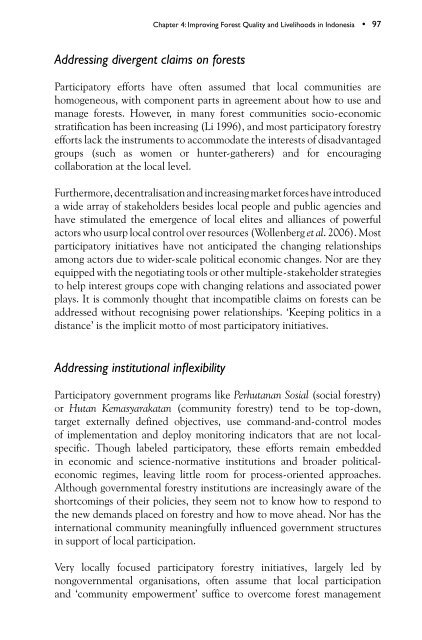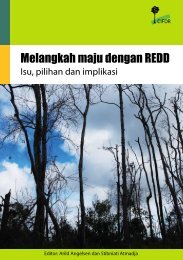Adaptive collaborative management of community forests in Asia ...
Adaptive collaborative management of community forests in Asia ...
Adaptive collaborative management of community forests in Asia ...
You also want an ePaper? Increase the reach of your titles
YUMPU automatically turns print PDFs into web optimized ePapers that Google loves.
Chapter 4: Improv<strong>in</strong>g Forest Quality and Livelihoods <strong>in</strong> Indonesia • 97<br />
Address<strong>in</strong>g divergent claims on <strong>forests</strong><br />
Participatory efforts have <strong>of</strong>ten assumed that local communities are<br />
homogeneous, with component parts <strong>in</strong> agreement about how to use and<br />
manage <strong>forests</strong>. However, <strong>in</strong> many forest communities socio-economic<br />
stratification has been <strong>in</strong>creas<strong>in</strong>g (Li 1996), and most participatory forestry<br />
efforts lack the <strong>in</strong>struments to accommodate the <strong>in</strong>terests <strong>of</strong> disadvantaged<br />
groups (such as women or hunter-gatherers) and for encourag<strong>in</strong>g<br />
collaboration at the local level.<br />
Furthermore, decentralisation and <strong>in</strong>creas<strong>in</strong>g market forces have <strong>in</strong>troduced<br />
a wide array <strong>of</strong> stakeholders besides local people and public agencies and<br />
have stimulated the emergence <strong>of</strong> local elites and alliances <strong>of</strong> powerful<br />
actors who usurp local control over resources (Wollenberg et al. 2006). Most<br />
participatory <strong>in</strong>itiatives have not anticipated the chang<strong>in</strong>g relationships<br />
among actors due to wider-scale political economic changes. Nor are they<br />
equipped with the negotiat<strong>in</strong>g tools or other multiple-stakeholder strategies<br />
to help <strong>in</strong>terest groups cope with chang<strong>in</strong>g relations and associated power<br />
plays. It is commonly thought that <strong>in</strong>compatible claims on <strong>forests</strong> can be<br />
addressed without recognis<strong>in</strong>g power relationships. ‘Keep<strong>in</strong>g politics <strong>in</strong> a<br />
distance’ is the implicit motto <strong>of</strong> most participatory <strong>in</strong>itiatives.<br />
Address<strong>in</strong>g <strong>in</strong>stitutional <strong>in</strong>flexibility<br />
Participatory government programs like Perhutanan Sosial (social forestry)<br />
or Hutan Kemasyarakatan (<strong>community</strong> forestry) tend to be top-down,<br />
target externally def<strong>in</strong>ed objectives, use command-and-control modes<br />
<strong>of</strong> implementation and deploy monitor<strong>in</strong>g <strong>in</strong>dicators that are not localspecific.<br />
Though labeled participatory, these efforts rema<strong>in</strong> embedded<br />
<strong>in</strong> economic and science-normative <strong>in</strong>stitutions and broader politicaleconomic<br />
regimes, leav<strong>in</strong>g little room for process-oriented approaches.<br />
Although governmental forestry <strong>in</strong>stitutions are <strong>in</strong>creas<strong>in</strong>gly aware <strong>of</strong> the<br />
shortcom<strong>in</strong>gs <strong>of</strong> their policies, they seem not to know how to respond to<br />
the new demands placed on forestry and how to move ahead. Nor has the<br />
<strong>in</strong>ternational <strong>community</strong> mean<strong>in</strong>gfully <strong>in</strong>fluenced government structures<br />
<strong>in</strong> support <strong>of</strong> local participation.<br />
Very locally focused participatory forestry <strong>in</strong>itiatives, largely led by<br />
nongovernmental organisations, <strong>of</strong>ten assume that local participation<br />
and ‘<strong>community</strong> empowerment’ suffice to overcome forest <strong>management</strong>
















